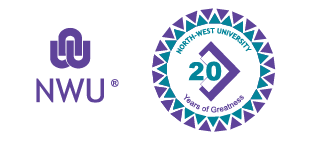The Faculty of Theology of the North-West University practises the science of Theology on Reformational foundation. This implies recognition that the Word of God, the Bible, originated through the inspiration of the Holy Spirit and that the Bible is therefore inspired and authoritative. This is the basis on which all paradigms (including our own) are subjected to constant critical and reformative study, while accommodating staff members and students of other theological persuasions who respect this Reformational foundation and inclusive approach.
The Faculty of Theology of the North-West University rests on a Reformed foundation. In this way it recognises its historical links with the Reformation of the 16th and 17th centuries, with the Theological School of the RCSA and with the PU for CHE in the period 1869 to 2004. The Reformed foundation implies recognition that the Word of God, the Bible, originated through the inspiration of the Holy Spirit and that it is authoritative. In our practice of Theology as a science, we recognise and respect the Reformed view of God and the written Word of God as the particular revelation of God. The Bible – the particular revelation of God, in addition to his revelation in creation – constitutes the object of scientific study. Teaching-learning, research and the application of expertise are conducted on this revelation and in the light thereof, through the illuminating work of the Holy Spirit. The kingship of God, owing to its primary position and significance in the Bible, is regarded as the orientational foundation on which Theology is practised.
This Reformed foundation and ethos entail a constant analytical, critical and Reformed scientific study of all paradigms (including our own), as well as the study of other theological paradigms and traditions, while accommodating staff members and students of other theological persuasions who respect the Reformed foundation and inclusive approach of the Faculty of Theology.
Application of the foundation
In its practice of Theology, the aim of the Faculty, within the unique nature of Theology, is to serve the church and society, both nationally and internationally, through the enhancement of the Christian faith, the reformation of the church, and the moral renewal of society. Therefore we present theological training and equipment of high academic standard, as agreed with specific denominations. According to the policy of the NWU, qualification programmes are presented to persons who wish to become professional theologians or who need theological and/or classic academic training for other professions, such as teachers, counsellors, psychologists and researchers. In the development of South African society, the Faculty accepts its responsibility to provide Reformed perspectives and make a significant contribution to meet the needs and wants of our society, based upon the expertise of its researches, according to the research policy of the Faculty.
The Faculty’s national and international relations and its special links and cooperation agreements with a number of other theological institutions as well as individual theologians in other traditions testify to its scientific openness, inclusiveness and critical approach. The Faculty of Theology puts a premium on regular national, international and professional assessment and evaluation of the academic standard and relevance of the Theology practised in the Faculty and embodied in its qualification programmes.
The practice of Theology and the teaching-learning and research in the Faculty are adaptable and open to criticism, and pursue effective and positive changes and developments. This adaptability and receptiveness apply not only to methodological and epistemological aspects but also to the application of scientific methods and technology.
6 August 2012
